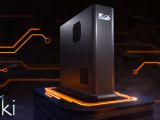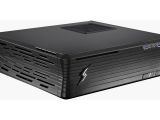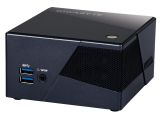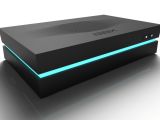I really don't think that Steam Machines know what their role is in this world. Whatever market segment they're targeting is as unclear to me as what benefits you can gain from owning one over a regular PC.
One of the immediate advantages that spring to mind is the fact that there is a much narrower array of hardware that software can be tested on to ensure a minimal amount of bugs in new releases; this is always a challenge when launching stuff on PCs, which are essentially an aggregated mass of slightly different hardware parts miraculously working together.
Valve has been doing a lot for the games industry in general, with what started as a platform for relaying patches in a timely manner and enforcing a cheat-free environment for people playing Counter-Strike becoming the biggest digital distribution system on the planet.
Sony sold 20 million PlayStation 4 units, Microsoft sold around 11 million at last tally, while Steam has around 125 million active users worldwide. A lot of PC gamers don't even use Steam. That means that the PC market is huge.
That also means that there is no need to "save" PC gaming by creating a more convenient way to enjoy entertainment. So what are Steam Machines really trying to accomplish?
People like consoles because they're easy to get into
One of the main draws of gaming on a console is the allure of ease and convenience. You don't have to hunch over a desk, you just lie down on the couch, controller in hand, and enjoy a nice gaming session on a big screen.
Of course, you can also do all of that with a PC, you just need to stick an HDMI cable in the thing and you're good to go, but that's already too much trouble for some.
In a world where people have become rich by providing support services to help others install Windows, which is basically as difficult as locating the button labeled "next" and clicking on it, having to go through the immense trouble of connecting a cable to the TV - god forbid you have to actually pick up and move your tower - is a genuine show stopper.
Meanwhile, the console, a box that doesn't know what spreadsheets are, and finds it difficult to play various open format media from standard storage devices, although it has pretty much the same hardware as a regular PC, never bothers you with such annoying prerequisites.
Once you have it installed, you just press a button and you're ready to go, without having to ever worry about drivers or finding updates, or hard drive partitions, where you install stuff, and so on. You just click the picture and your game starts up.
Furthermore, you don't have to worry about system specs. There's only one variant for each manufacturer, and the biggest choice you ever have to make is which brand to rally behind.
Steam Machines are confusing
Steam Machines, on the other hand, come from a wide range of manufacturers, with several murky tiers and prices that range from slightly above what an Xbox One or PlayStation 4 goes for, to the price of a couple of second-hand cars.
If you're not literate enough to be able to build your own PC, you're certainly not going to find it easier to choose from the specs on offer on the Steam Machines listing page.
Building a computer from separate parts is as easy as locking Lego blocks together, and picking the right parts (including scouring all nearby retailer listings) is around a day's worth of googling. If you happen to find that difficult, you're certainly not going to find choosing from fifteen different machines any easier.
Furthermore, when you buy a cheap Steam Machine, you're buying hardware that is already outdated by industry standards, whereas buying a console from Microsoft or Sony guarantees that you will be able to play anything that comes out in the next five to ten years, or even more, no matter how far or close the ninth-console generation is.
The PlayStation 3 came out in 2006 and only has 512 MB of RAM, half of it used by the system and half of it being video memory. And you can still play games on it today, and they look serviceable. Not great, but good enough.
There is no guarantee that you'll be able to do the same with a Steam Machine, which is, in my point of view, one of the main advantages of having a dedicated gaming console. You make a one-time investment in a semi-useless gimped computer, in order to avoid the need to keep up with technology for a certain duration.
Furthermore, both Sony and Microsoft have complete control over what gets published on their ecosystems, while Valve is much less restrictive, which means that developers are less likely to work on optimizing games to run great on the lowest-performing Steam Machine five years from now.
Other valid points
Another fact worthy to consider is that you can't trade Steam games once you're done with them, or buy second-hand titles, like you can on consoles.
The used games market is huge, but it is offset to a certain extent by the huge number of cheap games on Steam, and by the regular sales hosted on the platform, where you can find games released six months ago or less for half price or even better.
On consoles, you can buy all the cool games kids are playing on day one, and then trade them in or sell them to people who are willing to wait a while in order to get a better deal, so it's yet another reason to own a console.
I'm not even going to talk about platform-exclusive games. PC has the best exclusives hands down, both when it comes to quality and variety, but most of the time they lack the mass-market appeal that consoles blockbusters have.
People who want to play World of Warcraft and League of Legends on a TV while lying in bed are already doing that. Sure, it's more convenient to have a box near the TV, without having to set up anything before hand, but it's not worth buying a separate computer.
The only thing you really need is Steam Link, which is probably Valve's best shot at landing in the living room.
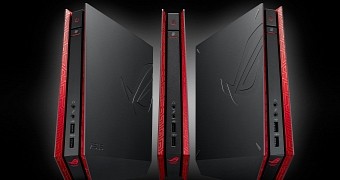
 14 DAY TRIAL //
14 DAY TRIAL // 
